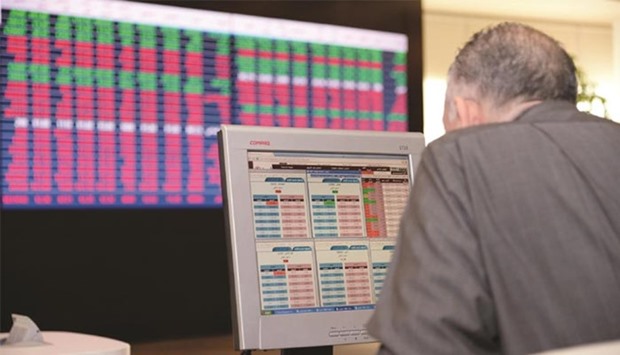An across the board selling – particularly in the telecom, realty, transport and industrials – led the 20-stock Qatar Index plunge 1.39% or 153 points for the second consecutive day to 10,836.74 points; but year-to-date, it was up 3.91%.
Foreign institutions, the prime target for overseas funds, however turned extremely pessimistic in the market, where many large and midcap equities witnessed faster run-off.
Trade turnover declined amidst a marginal increase in volumes, where banking, real estate and industrials stocks constituted more than 68% of the volumes.
Islamic stocks were seen declining faster than the conventional ones in the market, where local, Gulf and non-Qatari individual investors were increasingly net buyers, and Gulf and domestic institutions’ net selling weakened.
As much as QR8bn in capitalisation was wiped off and in the last two days itself a total of QR24bn eroded, indicating weakened expectations of future earnings and growth potential in the market.
Market capitalisation shrank 1.33% or about QR8bn to QR580.73bn as large, mid, small and microcap cap stocks fell 2.96%, 2.04%, 1.06% and 0.35% respectively.
Reflecting the overall mood in the key barometer, the Total Return Index shed 1.39% to 17,533.13 points, All Share Index by 1.34% to 2,982.21 points and Al Rayan Islamic Index by 1.69% to 4,093.37 points.
Telecom stocks shrank 2.04%, real estate (1.69%), transport (1.51%), industrials (1.41%), banks and financial services (1.31%), consumer goods (0.89%) and insurance (0.08%).
Influential losers included Vodafone Qatar, Ooredoo, Mazaya Qatar, Ezdan, Industries Qatar, Barwa, Nakilat, Aamal Company, Mesaieed Petrochemical Holding, Gulf International Services, QNB, Masraf Al Rayan, al khaliji, Qatar First Bank and Islamic Holding Group; even as United Development Company bucked the trend.
Non-Qatari institutions turned net sellers to the tune of QR16.56mn compared with net buyers of QR129.09mn on August 31.
However, local retail investors’ net buying increased perceptibly to QR43.17mn against QR25.69mn the previous day.
Non-Qatari individual investors’ net buying shot up to QR23.89mn compared to QR10.4mn on Wednesday.
The GCC (Gulf Cooperation Council) individual investors’ net buying rose to QR5.85mn against QR2.71mn on August 31.
Domestic institutions’ net selling weakened substantially to QR45.07mn compared to QR146.24mn the previous day.
The GCC institutions’ net profit booking also declined to QR11.28mn against QR21.6mn on Wednesday.
Total trade volume rose 8% to 10.82mn shares but value fell 3% to QR512.74mn whereas deals gained 15% to 6,522.
The consumer goods sector’s trade volume more than doubled to 0.49mn equities, value expanded 65% to QR20.49mn and transactions by 48% to 343.
There was 65% surge in the transport sector’s trade volume to 1.4mn stocks, 89% in value to QR47.95mn and 91% in deals to 597.
The insurance sector’s trade volume soared 18% to 0.2mn shares, value by 12% to QR16.19mn and transactions by 5% to 218.
The telecom sector saw 16% expansion in trade volume to 1.41mn equities but on 5% fall in value to QR62.78mn; even as there was 3% rise in deals to 784.
However, the real estate sector’s trade volume declined 10% to 2.16mn stocks and value by 11% to QR46.32mn, while transactions rose 29% to 944.
The market witnessed 3% shrinkage in the industrials sector’s trade volume to 1.43mn shares, 25% in value to QR88.45mn and 15% in deals to 1,220.
The banks and financial services sector’s trade volume was down less than 1% to 3.73mn equities and value by 5% to QR230.56mn but transactions shot up 20% to 2,416.
In the debt market, there was no trading of treasury bills and government bonds.

